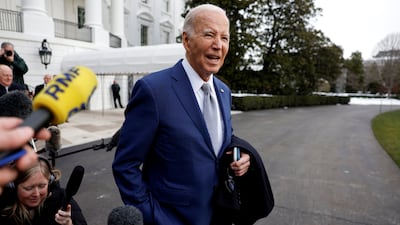Live updates: Follow the latest news on Israel-Gaza
US and British strikes against the Houthis in Yemen are not deterring the Iran-backed rebels but the military action will continue, President Joe Biden said on Thursday as the dangerous retaliations in the Red Sea escalate.
“Are [the strikes] stopping the Houthis? No. Are they going to continue? Yes,” Mr Biden told reporters.
Moments later, the Pentagon said US fighter jets had conducted a fifth strike on Houthi targets since last week, this time hitting two anti-ship missiles that were being prepared for launch towards the Red Sea.
The strike destroyed two Houthi anti-ship missiles that “were aimed into the southern Red Sea and prepared to launch,” US Central Command said in a statement posted to X.
They were conducted by Navy F/A-18 fighter aircraft, the Pentagon said.
The strike came just hours after the US said it fired a barrage of missiles from ships and submarines at 14 Houthi missiles that were ready for launch and considered to be an “imminent threat”.
The Houthis have conducted dozens of attacks in the Red Sea since November, claiming they are aiming for ships with ties to Israel as a response to the war in Gaza.
Critics say the Israeli connections are tenuous.
The risk to shipping has forced several global companies to reroute their vessels on an expensive trip around the southern tip of Africa.
Mr Biden's acknowledgement that military strikes are not working – so far – illustrates the dilemma facing his administration as it tries to contain the fallout from Israel's war in Gaza and seeks to avoid a broader regional war during months ahead of presidential elections.
The British military also took part in the first strikes last week.
“The United States is trying to avoid having to escalate further, but rather to do the minimum necessary to convince the Houthis to stop their attacks on international shipping,” said Tom Warrick, non-resident senior fellow with the Middle East Programmes at the Atlantic Council.
“It remains to be seen what it will take to to get the Houthis to stop these attacks.”
The US on Wednesday said it would re-list Yemen's Iran-backed Houthis as a specially designated global terrorist organisation, limiting the rebel group's access to funding.
But a network as large as the Houthis, which has been operating for three decades, is likely to be able to circumvent such measures, and the group shows no sign of stopping its harassment of commercial and military ships.
Ibrahim Jalal, non-resident scholar at the Middle East Institute, said the US-led strikes so far were limited in scope so as to avoid escalating the situation and getting into a broader conflict in Yemen with the Houthis and Iran.
“These attacks are symbolic. I mean, the United States cannot afford to do nothing. It's the only superpower in the world,” Mr Jalal told The National.
“They [the US and UK] have framed this as a challenge to the freedom of navigation … rather than a problem that is emanating from the Houthis in Yemen.”
The New York Times at the weekend quoted two US officials as estimating that the US-led strikes in Yemen had damaged or destroyed about 20 to 30 per cent of the Houthis' offensive capability.
But Mr Jalal said the current situation could drag on for some time, and that the extent of the Houthis' arsenal is not fully understood as it is spread across a vast area, often hidden underground in mountain areas.
Further complicating the dynamic, the Houthis are using their direct confrontation with the West as a recruiting tool and for gathering some support in Yemen.
“They think that God is with them, that [because] they defeated the Saudi-led coalition, they can defeat the US-led coalition now too,” Mr Jalal said.
The Pentagon has stressed that it does not seek a broader confrontation with the Houthis.
“We don't seek war. We don't think that we are at war. We don't want to see a regional war,” Pentagon spokeswoman Sabrina Singh said on Thursday.
“The Houthis are the ones that continue to launch cruise missiles or anti-ship missiles at innocent mariners, at commercial vessels that are just transiting an area that sees 10 to 15 per cent of the world's commerce.
"What we are doing with our partners is self-defence.”
National Security Council spokesman John Kirby said on Thursday that the US strikes would continue “for as long as they need to continue”.
“I’m not going to telegraph punches one way or another,” Mr Kirby told reporters.







